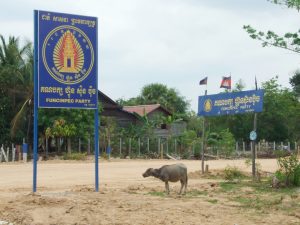Former Cambodian Prime Minister Prince Norodom Ranariddh is preparing to return to political life, more than two years after a fatal car accident that nearly claimed his life.
According to his party, the 77-year-old prince plans to once again take up the leadership of Funcinpec, a royalist party that he led to victory at elections in 1993 and has ruled on and off for much of the past three decades.
Funcinpec spokesperson Phan Sithy said in a press conference last week that Ranariddh’s health had improved following long-term medical treatment in France, and that he would return to lead the party at a party congress scheduled for February 27. “His health is much better, he walks on his own, has said a lot,” Sithy said.
He added that under Ranariddh’s leadership, the largely dormant party was optimistic of making a dent at commune-level elections next year and national elections in 2023. “We strongly hope that Funcinpec will get seats in the next election,” he said. While acknowledging that the party was “currently seen as silent,” Sithy said, “we are restructuring to be ready to participate in the upcoming commune and general elections.”
Depending on how one counts, this will be Prince Ranariddh’s third political comeback, after much-trumpeted returns in 2008 and 2015, neither of which amounted to much in electoral terms. The son of the talismanic Norodom Sihanouk, who governed Cambodia in the 1950s and 1960s and served as king from 1993 to 2004, Ranariddh led Funcinpec to victory at the historic United Nations-organized elections of 1993. But since then the party has steadily hemorrhaged support. It won 43 seats in the 1998 national election, 26 seats in 2003, and just two in 2008, before flaming out at national elections in 2013.
Once a staunch opponent of Prime Minister Hun Sen and his Cambodian People’s Party (CPP) – the two parties were on opposite sides of the country’s civil war in the 1980s – Ranariddh quickly acceded to his rival, who commanded greater resources, more extensive political networks, and a willingness to use force to shape political realities to his liking.
The defeat can be dated to 1997, when the two parties were coalition partners in government. In July of that year, Hun Sen’s forces conducted a lightning strike on a military faction loyal to Funcinpec, murdering many of its commanders and sending the prince briefly into exile abroad. While Ranariddh’s party joined coalition governments with the CPP after the 1998 and 2003 elections, it was increasingly as the junior member.
In 2006, Hun Sen engineered a split within Funcinpec that prompted Ranariddh’s expulsion from the party, and the fracturing of the royalist movement. He henceforth founded and led the short-lived and electorally irrelevant Norodom Ranariddh Party and Community of Royalist People’s Party, before returning to the helm of Funcinpec in 2015.
In June 2018, Ranariddh was involved in a fatal car crash that killed his wife Ouk Phalla and resulted in Ranariddh being flown to Thailand for medical treatment. He subsequently transferred control of the party over to his eldest son, Prince Norodom Chakravuth, and many thought that the tragic accident marked an end to his career.
But while Ranariddh’s impending political resurrection demonstrates his ubiquity, it is unlikely to have an appreciable political impact. Since the late 1990s, Funcinpec has grown more and more dependent on the CPP, and is now a fully owned subsidiary of Hun Sen’s party.
The best the party can hope for is to win a few parliamentary seats in 2023, and enter a “coalition” with the CPP by which Ranariddh and other senior party officials gain mid-ranking political appointments, by which they can generate revenues to distribute to their political networks. It is unlikely to offer the Cambodian people anything different from what they are getting from the CPP: patronage handouts and basic government services in exchange for political quiescence.
Yet Ranariddh’s announcement is significant insofar as it demonstrates the importance to the CPP of maintaining a façade of multi-party democracy following its disbanding of the Cambodia National Rescue Party, the country’s only viable opposition party, and its intensifying political crackdown. While Funcinpec’s existence is unlikely to convince Western governments and other outside critics, the party’s continuing survival sends a message to domestic constituencies that a certain degree of political pluralism will be permitted, on the condition that it does nothing to alter or threaten the status quo.

































